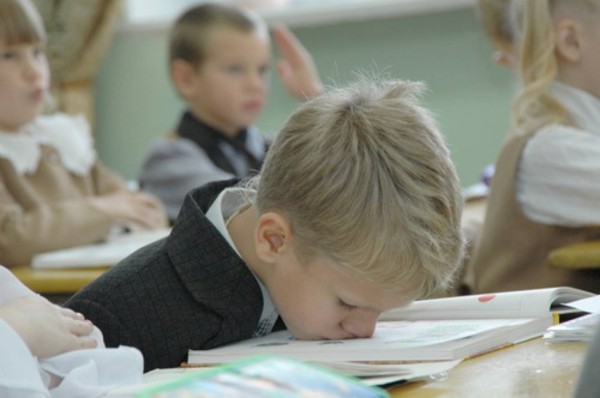Adapting to school: a natural process or problem
There comes a moment in every child's life when he needs to go to school. For many children, this time is associated with unpleasant moments of adaptation to new conditions. Most often, first-graders face the problem of getting used to a new learning process.
Content
School adaptation problems
Before starting school, children are usually in enthusiastic anticipation. They look forward to the moment when they can sit down at their desks and start learning. But after a couple of weeks of regular classes, the excitement disappears somewhere. The child has the first difficulties, he realizes that not everything is as wonderful as it was in his fantasies. The first grader has to adapt to new high demands from teachers, high workload and discipline. This period is called adaptation.
 For first-graders, the process of getting used to new conditions can last up to six months. The following factors affect its duration:
For first-graders, the process of getting used to new conditions can last up to six months. The following factors affect its duration:
- Baby's temperament and communication skills.
- The level of intellectual and emotional development.
- The type of educational institution and the complexity of the program.
- Attentive attitude and support from parents and teachers.
First of all, adaptation affects the physiological processes in the child's body. This affects his behavior. Your toddler may start to complain about headache, feel tired, he may lose his appetite and sleep disturbances. Some children become capricious and conflict with their parents. Usually, this habituation at the physiological level lasts until the end of the first quarter.
 Therefore, it is important for parents to be prepared for such behavior of the child. Show patience and do not punish the first grader, it is better to pay more attention to him - talk heart to heart, hug, call him affectionate. Make it clear to the child that you will support him in any case, be it a remark for bad behavior in the class or a bad mark for an unlearned lesson.
Therefore, it is important for parents to be prepared for such behavior of the child. Show patience and do not punish the first grader, it is better to pay more attention to him - talk heart to heart, hug, call him affectionate. Make it clear to the child that you will support him in any case, be it a remark for bad behavior in the class or a bad mark for an unlearned lesson.
How to help your child adapt to school
To make the process of adapting the baby to the new school conditions easier, give up the extension. Usually, they resort to prolongation when there is no one to look after the baby after school. Try to arrange things so that the child goes home after school. You can ask relatives or a neighbor of retirement age to help. If possible, take a vacation for this period.
If there is no way to refuse the extended course, then be sure to get acquainted with the teacher who deals with children on the extended course, pay attention to his attitude towards children.
 For a seven-year-old child, physical activity is very important. Indeed, before school hours, he was almost continuously on the move. Now he has to sit still for several hours in class. Do not take school breaks into account - they are too short. Physical education lessons will also not cover the kid's need for movement. To compensate for the long sitting in the classroom, enroll the child in the sports section, in the pool, take long walks before bedtime, in the morning do with him charging.
For a seven-year-old child, physical activity is very important. Indeed, before school hours, he was almost continuously on the move. Now he has to sit still for several hours in class. Do not take school breaks into account - they are too short. Physical education lessons will also not cover the kid's need for movement. To compensate for the long sitting in the classroom, enroll the child in the sports section, in the pool, take long walks before bedtime, in the morning do with him charging.
It is very important for a child at this age to walk in the fresh air. This will help his nervous system and overall physical health. Let the baby spend less time indoors, especially sitting at the computer, and preferably walk more. During the holidays, you can take your child for a walk twice a day.
Another important circumstance is full sleep child. Lack of sleep will cause him to fall asleep in class. Agree, this will not have the best effect on his studies:
- Put your baby to sleep during the day if he is used to it.
- The baby should go to bed no later than 9 pm and the duration of his sleep should be about 11 hours a day.
- To make it easier for your child to fall asleep, do not let him play noisy games before bed or sit at the computer.
- A warm bath before bedtime or a glass of warm milk helps to fall asleep very well.
The child does not want to go to school: what to do
Often parents are faced with the fact that the kid refuses to attend school, wants to stay at home and play with his favorite toys. According to psychologists, there may be enough reasons for this behavior.
 Among the most common are the following reasons:
Among the most common are the following reasons:
- Difficult adaptation process. For first graders, this is a fairly common occurrence. Usually? in a few months the child gets used to new requirements. To facilitate this process, talk to your child, try to find positive moments together in the fact that he went to study. If, after a few months, he still could not adapt to new trends, then seek help from a good psychologist or teacher.
- Learning difficulties coupled with exaggerated parenting requirements. This leads to the fact that the child begins to think that he does not meet parental requirements, upsets them. Because of this, she refuses to go to school at all. In this situation, reconsider your requirements. Remember that the child does not owe you anything. Moreover, he is not obliged to study well for the sake of his parents. Better, together with the teacher, help the child to establish the educational process.
- Great fatigue. This may be due to the fact that in addition to schoolwork, the child also attends a bunch of different circles, sections and tutors. In this mode, he has absolutely no time for rest, walks and entertainment. Adjust the baby's day regimen, give up some additional activities in favor of rest for the child.
- Problems in the development of the child. If your child from the very first day cannot tune in to study, does not have time to complete tasks, or cannot understand at all what the teacher wants from him, then perhaps he is lagging behind in development from his peers. In this situation, it is best to talk frankly with the teacher and decide on the transfer of the child to a specialized educational institution or on additional developmental activities.
How long does adaptation take
The exact adaptation time cannot be specified. Too many individual parameters affect its duration. For some children, adaptation takes only a couple of weeks, while others get used to school for the entire first year of school. But on average, the adaptation process ends by the new year.
 It was noticed that sociable children quickly get used to new learning conditions, and those who are used to keeping their experiences to themselves, adapt to school much later. The support of the parents and the attitude of the teacher are also important for adaptation.
It was noticed that sociable children quickly get used to new learning conditions, and those who are used to keeping their experiences to themselves, adapt to school much later. The support of the parents and the attitude of the teacher are also important for adaptation.


